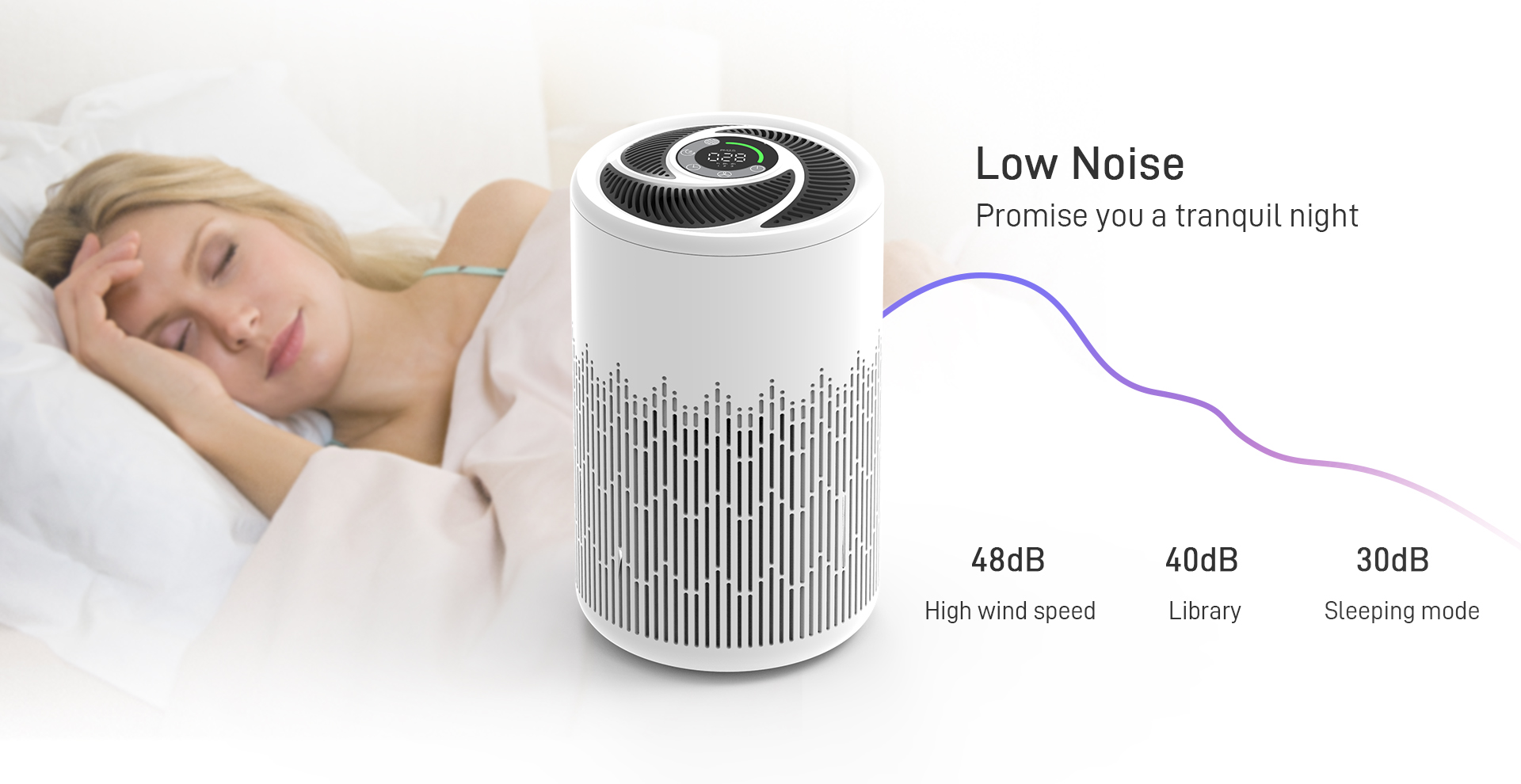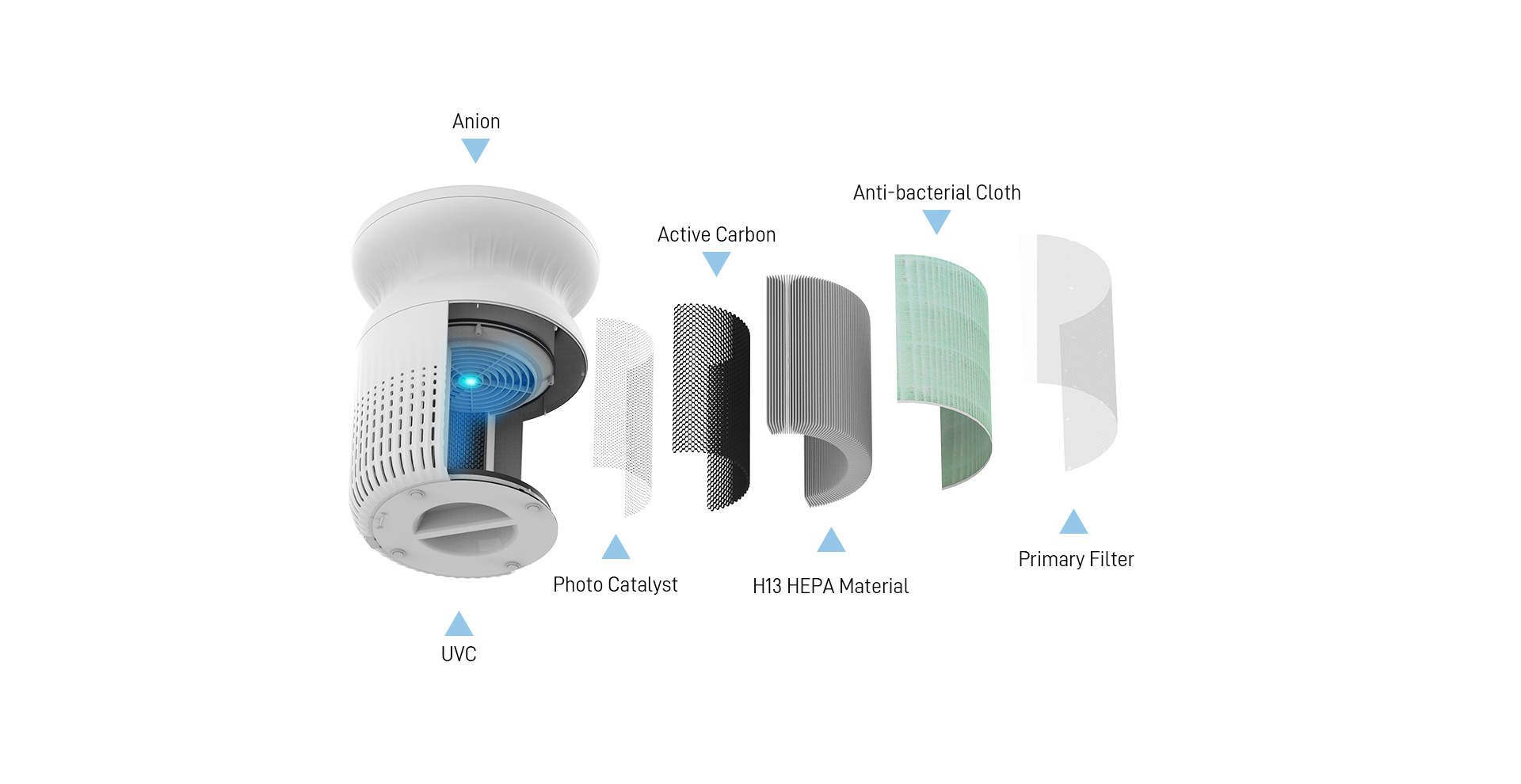Ein HEPA-Filter (High-Efficiency Particulate Air) ist ein wichtiges Element in vielen Luftreinigern, HLK-Systemen und sogar Staubsaugern und bietet eine hervorragende Filterung kleiner Partikel wie Staub, Pollen, Rauch und Tierhaare. Aber wie lange halten diese Filter tatsächlich? In diesem Artikel werden wir uns die Faktoren genauer ansehen, die die Lebensdauer eines Luftreiniger mit HEPA-Filter, wie Sie erkennen, wann es Zeit für einen Austausch ist, und Tipps zur Verlängerung der Filterlebensdauer. Darüber hinaus untersuchen wir die Vorteile einer Investition in meistverkaufte, hochwertige Luftreiniger für eine bessere Raumluftqualität.

1. Faktoren, die die Lebensdauer eines HEPA-Filters beeinflussen
Die Haltbarkeit eines Luftreinigers mit HEPA-Filter hängt von verschiedenen Faktoren ab. Sehen wir uns die wichtigsten Elemente an, die sich auf die Lebensdauer Ihres Filters auswirken.
a. Häufigkeit der Nutzung
Einer der Hauptfaktoren, die die Lebensdauer eines HEPA-Filters beeinflussen, ist, wie oft Sie Ihren Luftreiniger verwenden. Je häufiger der Reiniger läuft, desto schneller sammelt sich Staub und Schmutz im Filter an. Wenn Sie einen Luftreiniger regelmäßig in einem stark frequentierten Bereich oder einem Raum mit vielen Allergenen verwenden, müssen Sie den Filter häufiger austauschen.
b. Umgebungsbedingungen
Die Luftqualität in Ihrer Umgebung ist ein weiterer wichtiger Aspekt. Wenn Sie in einer verschmutzten Gegend oder in der Nähe von starkem Verkehr leben oder Haustiere haben, muss Ihr Luftreiniger mit HEPA-Filter wahrscheinlich härter arbeiten, was zu einer schnelleren Ansammlung von Schadstoffen führt. Für Häuser unter solchen Bedingungen empfiehlt es sich, nach hochwertigen Luftreinigern zu suchen, die mit einem robusten Filtersystem ausgestattet sind, um die zusätzliche Belastung zu bewältigen.
c. Filterqualität
Die Konstruktion und Qualität des HEPA-Filters selbst sind entscheidend für seine Langlebigkeit. Hochwertige Luftreiniger verfügen häufig über erstklassige HEPA-Filter, die länger halten und effizienter arbeiten. Filter aus langlebigen Materialien, die nach Industriestandards zertifiziert sind, halten im Allgemeinen länger und bieten eine bessere Filterung.
d. Luftstrom und Filtertyp
Der Luftstrom beeinflusst, wie schnell der Filter verstopft. Hocheffiziente HEPA-Filter, die für einen starken Luftstrom ausgelegt sind, können sich schneller füllen als andere. Darüber hinaus kann der Typ des HEPA-Filters – ob echter HEPA, HEPA-Typ oder andere – Einfluss darauf haben, wie lange der Filter wirksam ist.
2. Anzeichen dafür, dass Ihr HEPA-Filter ausgetauscht werden muss
Irgendwann muss jeder Luftreiniger mit HEPA-Filter ausgetauscht werden. Hier sind die häufigsten Anzeichen dafür, dass es Zeit ist, den Filter zu wechseln:
a. Verringerter Luftstrom
Eine merkliche Verringerung des Luftstroms ist oft das erste Anzeichen dafür, dass der HEPA-Filter verstopft ist. Wenn Ihr Luftreiniger Probleme hat, Luft durch den Filter zu drücken, ist es wahrscheinlich Zeit für einen neuen.
b. Unangenehme Gerüche
Ein muffiger oder abgestandener Geruch, der von Ihrem Luftreiniger mit HEPA-Filter ausgeht, deutet darauf hin, dass der Filter mit Staub, Allergenen und sogar Gerüchen gesättigt ist. Dies ist ein klares Zeichen dafür, dass der Filter die Luft nicht mehr richtig reinigen kann.
c. Erhöhte Staubbelastung und Allergien
Wenn Sie bemerken, dass sich in Ihrem Zuhause mehr Staub ansammelt oder Ihre Allergiesymptome wieder auftreten, funktioniert Ihr HEPA-Filter möglicherweise nicht mehr richtig. Durch den Filterwechsel können Sie die Effizienz Ihres Luftreinigers bei der Entfernung von Partikeln aus der Luft wiederherstellen.
d. Vom Hersteller empfohlener Zeitplan
Die meisten hochwertigen Luftreiniger haben einen empfohlenen Austauschzeitplan, der normalerweise zwischen 6 und 12 Monaten liegt. Wenn Sie die Richtlinien des Herstellers überprüfen, stellen Sie sicher, dass Sie den Filter zum optimalen Zeitpunkt austauschen.
3. So pflegen Sie Ihren HEPA-Filter für eine längere Lebensdauer
Durch die richtige Pflege können Sie die optimale Leistung Ihres Luftreinigers mit HEPA-Filter erzielen und den Austausch hinauszögern. Hier sind einige einfache Schritte, um die Lebensdauer Ihres Filters zu verlängern:
a. Regelmäßige Wartung der Vorfilter
Einige Luftreiniger sind mit Vorfiltern ausgestattet, die größere Partikel auffangen, bevor sie den HEPA-Filter erreichen. Wenn Sie diese Vorfilter regelmäßig reinigen oder austauschen, können Sie die Belastung Ihres primären HEPA-Filters verringern und so seine Lebensdauer verlängern.
b. Halten Sie Ihren Luftreiniger sauber
Bei Luftreinigern mit HEPA-Filter und waschbaren Filtern kann eine regelmäßige Reinigung deren Lebensdauer verlängern. Befolgen Sie unbedingt die Reinigungsrichtlinien des Herstellers, um eine Beschädigung des Filters zu vermeiden.
c. Minimieren Sie Schadstoffe in Innenräumen
Sie können die Belastung Ihres HEPA-Filters verringern, indem Sie Schadstoffe in Innenräumen kontrollieren. Halten Sie an windigen Tagen die Fenster geschlossen, verwenden Sie Fußmatten, um Schmutz zu vermeiden, und vermeiden Sie das Rauchen in Innenräumen, um zu verhindern, dass zusätzliche Partikel in die Luft gelangen.
d. Richtige Platzierung
Stellen Sie sicher, dass Ihr Luftreiniger mit HEPA-Filter in einem gut belüfteten Bereich aufgestellt wird, in dem die Luft frei zirkulieren kann. Stellen Sie ihn nicht in der Nähe von Wänden oder in Ecken auf, da ein blockierter Luftstrom den Filter härter arbeiten lassen und seine Wirksamkeit verringern kann.
4. Wann sollten Sie Ihren HEPA-Filter austauschen?
Die typische Lebensdauer eines Luftreinigers mit HEPA-Filter beträgt zwischen 6 und 12 Monaten. Je nach Qualität des Filters, Nutzungshäufigkeit und Umgebungsbedingungen muss der Filter jedoch möglicherweise häufiger oder seltener ausgetauscht werden. In Gebieten mit hoher Umweltverschmutzung oder in Haushalten mit Haustieren oder Rauchern kann ein häufigerer Filteraustausch erforderlich sein.
Im Zweifelsfall halten Sie sich immer an den vom Hersteller empfohlenen Zeitplan für Ihre hochwertige Luftreiniger, oder ersetzen Sie den Filter, wenn Sie Anzeichen wie verringerten Luftstrom, Gerüche oder verstärkte Allergiesymptome bemerken.
Ein Luftreiniger mit HEPA-Filter ist eine Investition in die Luftqualität in Ihrem Zuhause. Zu wissen, wie lange der Filter hält und wann er ausgetauscht werden muss, ist der Schlüssel zur Erhaltung gesunder Raumluft. Regelmäßige Wartung, sorgfältige Überwachung auf Anzeichen von Verschleiß und Kenntnis der Lebensdauer Ihres HEPA-Filter kann eine optimale Leistung gewährleisten.
Egal, ob Sie nach einem neuen Filter suchen oder einen alten ersetzen möchten: Die Investition in hochwertige Luftreiniger mit langlebigen, hocheffizienten HEPA-Filtern trägt dazu bei, saubere, allergenfreie Luft in Ihrem Zuhause zu erhalten. Wenn Sie Ihren Luftreiniger richtig pflegen und die richtigen Produkte auswählen, genießen Sie das ganze Jahr über eine sauberere, gesündere Umgebung.
Wenn Sie einen Luftreiniger auswählen möchten, der die Staubbelastung in Innenräumen reduzieren und die Luft reinigen kann, empfehle ich Ihnen, die Marke Leking auszuprobieren. Leking wird weithin für seine hervorragende Filtertechnologie und überlegene Leistung gelobt. Ihre Luftreiniger verwenden hocheffiziente Partikelfilter (HEPA), die winzige Partikel wie Staub, Pollen und Tierhaare effektiv einfangen können. Darüber hinaus verfügen die Luftreiniger von Leking auch über fortschrittliche Negativionengeneratoren und Aktivkohlefilter, die Gerüche entfernen und Schadstoffe absorbieren können. Ob zur Verbesserung der Raumluftqualität oder zur Reduzierung der Staubbelastung – Luftreiniger von Leking sind eine zuverlässige Wahl.



